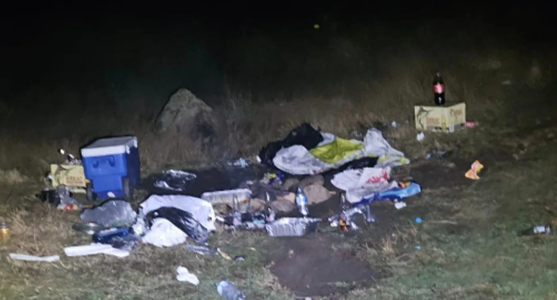Messy misadventures: Rubbish crisis in Kosciuszko sparks calls for tougher park protections
- Replies 7
Australia is renowned for its breathtaking natural landscapes, and our national parks are the crown jewels of this scenic splendour.
They are sanctuaries for wildlife, havens for nature lovers, and sources of national pride.
However, the sanctity of these spaces is under threat, not from natural disasters or invasive species but from an entirely preventable problem.
The issue arose at the Kosciuszko National Park in the NSW Snowy Mountains, a place of rugged beauty and ecological significance.
This park, already grappling with the impact of feral brumbies, the pressures of four-wheel driving, and increased tourism, is now facing a new challenge.
A recent surge in camping led to an accumulation of ‘awful’ rubbish, which appalled residents and environmentalists.
Snowy Mountains residents assert that authorities have long been aware of this issue.

Images circulating on social media depict a campsite at the Island Bend Campground littered with discarded eskies, shattered glass, empty liquor bottles, plastic waste, and remnants of burnt rubbish.
This ‘grubby’ act has sparked outrage among Australians who cherish the park and its wildlife. Tired of the disrespect shown to their backyard, the local community is calling for action.
One local, dismayed by the mess a group of campers left behind, took to the internet to voice her frustration.
She described the litterers as ‘grubs’ and expressed she ‘wasn't surprised’ at the scene.
‘Five local grubs decided a night of camping was needed and thought this was appropriate,’ she stated.
Respondents called the sight ‘awful’ and ‘unacceptable’, though many noted that such disrespectful behaviour was not uncommon.
The NSW National Parks and Wildlife Service (NPWS) acknowledged the problem, stating, ‘Littering unfortunately remains an ongoing issue within Kosciuszko National Park, and addressing this concern is a priority.’
The community's response has been swift and clear: there are growing calls for tougher penalties for those caught littering and measures to restrict access to vulnerable areas.
A woman who recently visited the area suggested that lockable gates in specific locations would help protect the park.
‘I’m personally for more gates to places like this,’ she said.
‘My family and I just had our first trip to Island Bend for four days and it was incredible. But a locked gate with a gate code that you will be given when you book your place wouldn’t be a bad idea.’
‘Of course, it won’t stop some people paying and getting the code and still doing this. But it’s a start. Amazing places like this must be protected for decent people.’
Another responded, ‘We need to start doing similar.’
‘We've experienced the same issues at Mimosa National Park. Certain mobs will set up camp but when they leave, their idea of packing up is to chuck everything on the fire—tent, chairs, the lot,’ a third shared.
The NPWS spokesperson described the scene at Island Bend as ‘disappointing’.
‘The NPWS encourages all visitors and campers to adhere to the principles of “Leave No Trace”. We ask that visitors leave the park in an even better condition than they found it, disposing of their rubbish responsibly and carrying out any additional litter they may encounter,’ they said.
This isn't the first time careless visitors have marred Australia's natural wonders.
Last month, Turquoise Coast in Western Australia, a popular coastal camping spot was left in a sorry state after the Easter long weekend, and the once pristine Noosa North Shore of the Sunshine Coast was similarly defiled.
In response to these incidents, authorities have been conducting an illegal camping ‘blitz’, issuing fines to those who flout the rules.
The recent outcry over the unsightly and disrespectful behaviour at Island Bend in the Snowy Mountains highlights a growing concern about maintaining the integrity and safety of Australia's beloved national parks.
This incident led to renewed calls for tighter security measures, such as locking certain areas' gates to protect these natural treasures.
As thousands of visitors flock to Australia's national parks each year, many taking unnecessary risks, the critical question is how to keep people safe while preserving the beauty and cleanliness of these cherished landscapes.
 Have you visited Kosciuszko National Park or other national parks recently? What measures do you think could be implemented to prevent littering and protect these areas? Share your experiences and suggestions in the comments below.
Have you visited Kosciuszko National Park or other national parks recently? What measures do you think could be implemented to prevent littering and protect these areas? Share your experiences and suggestions in the comments below.
They are sanctuaries for wildlife, havens for nature lovers, and sources of national pride.
However, the sanctity of these spaces is under threat, not from natural disasters or invasive species but from an entirely preventable problem.
The issue arose at the Kosciuszko National Park in the NSW Snowy Mountains, a place of rugged beauty and ecological significance.
This park, already grappling with the impact of feral brumbies, the pressures of four-wheel driving, and increased tourism, is now facing a new challenge.
A recent surge in camping led to an accumulation of ‘awful’ rubbish, which appalled residents and environmentalists.
Snowy Mountains residents assert that authorities have long been aware of this issue.

Recent incidents prompted calls for stricter penalties for littering in Australia's national parks. Credits: Facebook
Images circulating on social media depict a campsite at the Island Bend Campground littered with discarded eskies, shattered glass, empty liquor bottles, plastic waste, and remnants of burnt rubbish.
This ‘grubby’ act has sparked outrage among Australians who cherish the park and its wildlife. Tired of the disrespect shown to their backyard, the local community is calling for action.
One local, dismayed by the mess a group of campers left behind, took to the internet to voice her frustration.
She described the litterers as ‘grubs’ and expressed she ‘wasn't surprised’ at the scene.
‘Five local grubs decided a night of camping was needed and thought this was appropriate,’ she stated.
Respondents called the sight ‘awful’ and ‘unacceptable’, though many noted that such disrespectful behaviour was not uncommon.
The NSW National Parks and Wildlife Service (NPWS) acknowledged the problem, stating, ‘Littering unfortunately remains an ongoing issue within Kosciuszko National Park, and addressing this concern is a priority.’
The community's response has been swift and clear: there are growing calls for tougher penalties for those caught littering and measures to restrict access to vulnerable areas.
A woman who recently visited the area suggested that lockable gates in specific locations would help protect the park.
‘I’m personally for more gates to places like this,’ she said.
‘My family and I just had our first trip to Island Bend for four days and it was incredible. But a locked gate with a gate code that you will be given when you book your place wouldn’t be a bad idea.’
‘Of course, it won’t stop some people paying and getting the code and still doing this. But it’s a start. Amazing places like this must be protected for decent people.’
Another responded, ‘We need to start doing similar.’
‘We've experienced the same issues at Mimosa National Park. Certain mobs will set up camp but when they leave, their idea of packing up is to chuck everything on the fire—tent, chairs, the lot,’ a third shared.
The NPWS spokesperson described the scene at Island Bend as ‘disappointing’.
‘The NPWS encourages all visitors and campers to adhere to the principles of “Leave No Trace”. We ask that visitors leave the park in an even better condition than they found it, disposing of their rubbish responsibly and carrying out any additional litter they may encounter,’ they said.
This isn't the first time careless visitors have marred Australia's natural wonders.
Last month, Turquoise Coast in Western Australia, a popular coastal camping spot was left in a sorry state after the Easter long weekend, and the once pristine Noosa North Shore of the Sunshine Coast was similarly defiled.
In response to these incidents, authorities have been conducting an illegal camping ‘blitz’, issuing fines to those who flout the rules.
The recent outcry over the unsightly and disrespectful behaviour at Island Bend in the Snowy Mountains highlights a growing concern about maintaining the integrity and safety of Australia's beloved national parks.
This incident led to renewed calls for tighter security measures, such as locking certain areas' gates to protect these natural treasures.
As thousands of visitors flock to Australia's national parks each year, many taking unnecessary risks, the critical question is how to keep people safe while preserving the beauty and cleanliness of these cherished landscapes.
Key Takeaways
- Following recent incidents, there has been a call for tougher penalties for campers who litter in Australia's national parks.
- The latest incident involved campers leaving a significant amount of rubbish at the Island Bend Campground in Kosciuszko National Park.
- Locals and authorities are exasperated by the ongoing littering issue, and some suggest installing lockable gates to help protect vulnerable areas.
- The NSW National Parks and Wildlife Service urged visitors to follow the ‘Leave No Trace’ principles and dispose of their trash responsibly.







